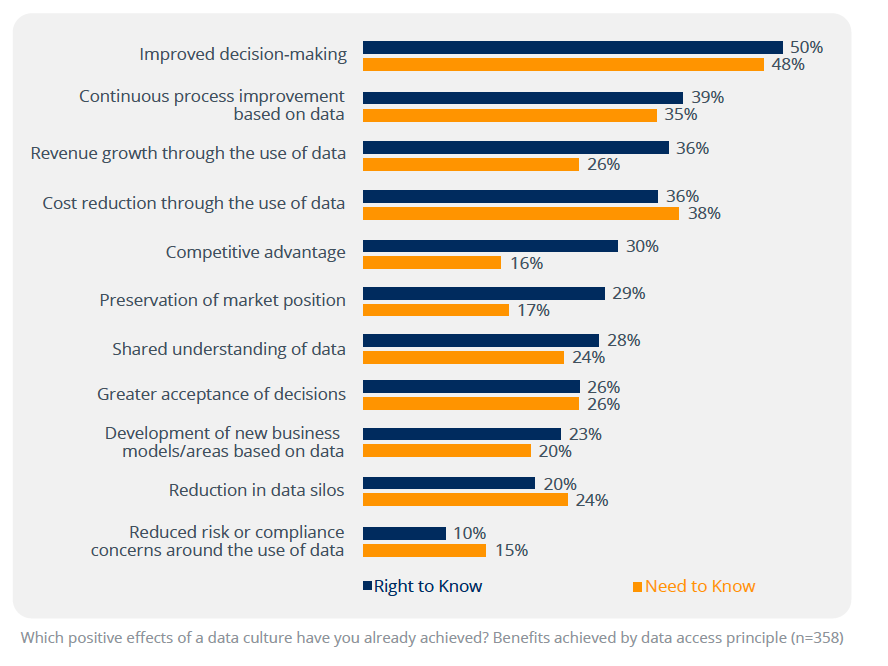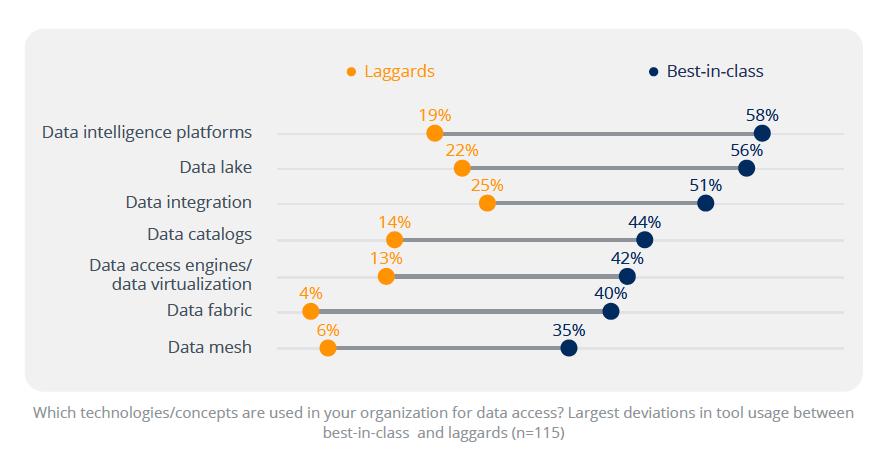Zeenea is a proud sponsor of BARC’s Data Culture Survey 23. Get your free copy here.
In last year’s BARC Data Culture Survey 22, “data access” was selected as the most relevant aspect of BARC’s ‘Data Culture Framework’. Therefore, this year, BARC examined the current status, experiences, and plans of companies with regard to their efforts to create a positive data culture with a special emphasis on ‘data access’.
The study was based on the findings of a worldwide online survey conducted in July and August 2022. The survey was promoted within the BARC panel, as well as via websites and newsletter distribution lists. A total of 384 people took part, representing a variety of different roles, industries, and company sizes.
In this article, discover the findings regarding enterprise data access of BARC’s Data Culture Survey 23.
”Right to know” versus “Need to know” principles
53% of best-in-class* companies rely on the Right to know principle. But only 24% of laggards concur.
In their study, BARC describes two principles that can be observed regarding data access: Need to know refers to a more restrictive approach, where users must ask for authorization to access data. In contrast, the Right to know model refers to the propagation of a data democracy, where data access is free for all employees, limited only by intentionally restricted data (e.g., secret, personal, or similar data).
The Need to know approach has always been the predominant model for data access, with 63 percent of participants confirming that this approach prevails in their organization. However, significantly more than half of the sample consider the Right to know to be the most beneficial model.
For many respondents, however, there is still a significant gap between their wishes and reality. Right to know is practiced mainly by small companies. This is not surprising due to their simple and flat organizational structures and straightforward communication channels. In fact, BARC found that as the size of a company increases, so does its organizational complexity and the demands on data governance. The Need to know principle tends to prevail in this case.
Companies that predominantly practice the Right to know principle believe that they generate greater benefits from data than companies adopting Need to know. For example, they report a much higher rate of achievement when it comes to gaining a competitive advantage, preserving market position, and growing revenue.

The technologies & tools associated with data access
It is no secret: data access requires technical support. According to BARC, around two-thirds of the companies surveyed use traditional data warehousing and BI technologies. And 69 percent use Excel and 51 percent use self-service analytics tools. These figures aren’t surprising If the objective is to solve these challenges with existing enterprise tools.
It is worth mentioning that 32 percent use code to manage data access, which corresponds to BARC’s general market perception that languages such as Python are gaining a stronger foothold in the enterprise data landscape.
In turn, the need for transparency to be able to find data, features, and algorithms in an uncomplicated manner and to integrate them securely is also increasing. Thus providing the breeding ground for software providers to offer new solutions that help to manage and monitor code in order to have a controlled and monitored process.

The survey shows that there is a great deal of catching up to do in terms of technologies for data access! Fewer than 25 percent of the companies surveyed use data intelligence platforms or data catalogs. However, it is precisely these solutions that help to compile knowledge about data outside of the BI context, across systems, and make it analyzable, thus addressing the main challenges to data access.
The importance of data knowledge has been recognized above all by best-in-class* companies. 58 percent use data intelligence platforms, compared with only 19 percent of laggards*.

The lack of competence in new technologies
Of course, technology is only half the solution to data access problems. As mentioned in a previous article, many challenges have their origin in a lack of strategy or organization.
The added value of technologies for increasing data access is limited. Only just over half succeed in improving data access through BI and data warehouse technologies, and only one in three companies manage it with self-service analytics tools.
Data virtualization tools, data intelligence platforms, and data catalogs play a remarkable role in the technical support of data access. These tools can clearly add value, but BARC states that there is probably a lack of knowledge and training to be able to use them extensively.
Indeed, 39 percent of respondents complain about a lack of skills as the second most common obstacle to data access!
Liberalize data access & empower your data users through a strong data culture
If you’re interested in learning more about the findings of BARC’s Data Culture survey 23 & the importance of democratizing data access, download the document for free!
By downloading the survey, get insights on:
- The assessment of the data access philosophies,
- The effects of the implementation of a data culture,
- The challenges of implementing data access,
- And much more.
* The sample was divided into ‘best-in-class’ and ‘laggards’ in order to identify differences in terms of the current data culture within organizations. This division was made based on the question “How would you rate your company’s data culture compared to your main competitors?”. Companies that have a much better data culture than their competitors are referred to as ‘best-in-class’, while those who have a slightly or much worse data culture than their competitors are classed as ‘laggards’.








